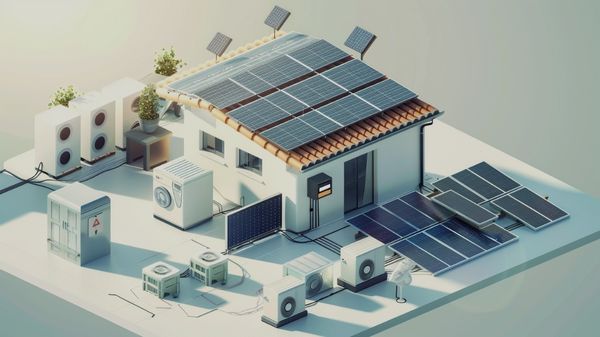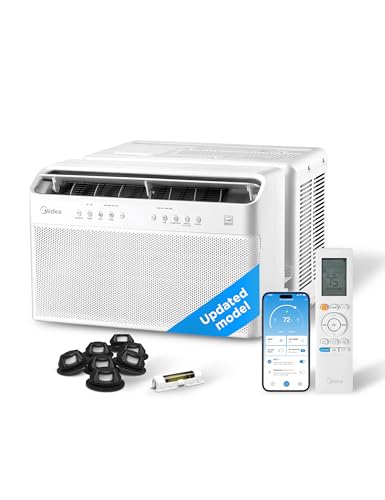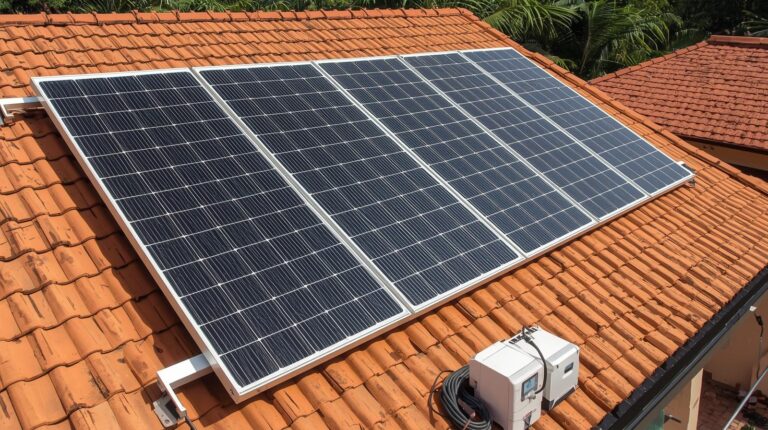With 15 kW, running your entire house depends on various factors like the size of your residence and energy-efficient practices. Essential appliances such as refrigerators or HVAC systems are power-hungry, impacting overall consumption.
HVAC systems play a pivotal role, needing more power during peak seasons. Energy audits can pinpoint areas for improvement, helping optimize consumption. Smart home technologies like thermostats and automation enhance energy efficiency.
Solar panels or wind turbines, coupled with energy storage, can offset traditional sources. Utility incentives and programs encourage efficiency upgrades. Understanding power needs and integrating renewable sources are vital, making 15 kW a starting point for your energy journey.
Key Takeaways
- 15 kW can provide about 450 kWh per day, sufficient for an average household’s energy needs.
- Peak demand times may require more energy than 15 kW can supply, impacting overall power availability.
- Essential appliances like HVAC systems and refrigerators consume significant power, affecting energy usage.
- Lifestyle choices, appliance efficiency, and family size impact overall energy consumption, influencing 15 kW sufficiency.
- Energy audits help identify areas for improvement and optimize energy consumption, ensuring efficient use of 15 kW.
Understanding Kilowatts (kW)
- Kilowatt (kW) is a unit of power measurement that represents the rate at which energy is used.
- 1 kilowatt is equal to 1,000 watts, making it a larger unit for measuring electricity consumption.
- The power rating of your appliances is typically listed in watts or kilowatts to indicate their energy requirements.
- Monitoring your kilowatt usage can help you track and optimize your energy consumption, leading to potential cost savings and environmental benefits.
Average Household Power Consumption
Understanding the average power consumption of a household is essential for managing energy usage effectively. The average usage of electricity in a home can vary based on factors such as peak demand, seasonal variations, lifestyle choices, appliance efficiency, family size, geographic location, and energy sources.
Here are some key points to take into account:
- Average usage: The average American household consumes around 877 kWh per month.
- Peak demand: Certain times of the day may have higher power demands due to activities like cooking or heating.
- Seasonal variations: Energy usage can fluctuate based on weather conditions, with more power needed for heating or cooling.
- Lifestyle factors: Different lifestyles can impact energy consumption, such as working from home or using energy-intensive hobbies.
- Appliance efficiency: Using energy-efficient appliances can notably reduce power consumption.
- Family size: Larger families typically consume more electricity than smaller households.
- Geographic location: Energy costs and availability of renewable sources can influence usage patterns.
⚡ Stay Powered When the Grid Goes Down
What if you could keep lights, devices, and even critical systems running during any blackout? That’s exactly what Dark Reset shows you how to do—using simple, proven methods. Discover lots of ways to prepare for energy independence.
Essential Appliances and Power Requirements
To effectively manage your household’s energy usage, it’s essential to understand the power requirements of important appliances.
When considering the power needs of your home, it’s important to factor in various elements such as solar energy utilization, appliance upgrades for energy efficiency, conducting energy audits, installing smart thermostats, utilizing power strips to prevent standby power consumption, participating in demand response programs, implementing load shedding strategies during peak times, considering battery storage for backup power, and exploring the benefits of using reconditioned batteries for cost-effective energy solutions.
Impact of Heating and Cooling Systems
Heating and cooling systems play an essential role in maintaining a comfortable and energy-efficient home. Your HVAC systems are pivotal in guaranteeing the heating efficiency and cooling capacity necessary for year-round temperature control.
The energy demand of these systems can vary greatly based on seasonal fluctuations, making it important to evaluate their performance regularly. Insulation impact is another key factor to take into account, as proper insulation can enhance the efficiency of your heating and cooling systems by reducing energy loss.
To optimize your system’s performance, regular maintenance is critical. Scheduled check-ups and timely repairs can improve energy efficiency and extend the lifespan of your HVAC equipment. Understanding the importance of proper sizing of your off-grid solar system is crucial for affordability and efficiency.
By staying proactive with system maintenance, you can prevent costly breakdowns and confirm that your heating and cooling systems operate at peak efficiency.
Understanding the dynamics of your heating and cooling systems empowers you to make informed decisions that promote both comfort and energy savings in your home.
Evaluating Energy-Efficient Practices
Evaluating your household’s energy-efficient practices is essential in reducing your overall energy consumption and utility costs. By implementing energy-saving techniques, you can not only lower your bills but also contribute to a greener environment.
Consider conducting energy audits to pinpoint areas of improvement and invest in energy-efficient upgrades like LED lighting, efficient appliances, and insulation techniques. Incorporating solar energy systems, smart thermostats, and programmable controls can further enhance your home’s energy efficiency.
Additionally, participating in demand response programs can help manage electricity usage during peak times. Solar panels are a great way to harness sunlight for power and reduce reliance on traditional energy sources.
Evaluate your current practices and make changes to create a more energy-efficient home that benefits both your wallet and the planet.
Assessing Backup Power Needs
When considering backup power needs for your household, it’s essential to assess your requirements based on factors like the frequency and duration of power outages in your area.
To guarantee you have a reliable backup power solution, consider the following:
- Generator Capacity: Determine the size of the generator needed based on your peak demand and essential appliances to keep your household running during outages.
- Fuel Types: Explore different fuel options such as gasoline, propane, or diesel for your generator, considering availability and storage requirements.
- System Maintenance: Regularly maintain your backup power system to make sure it functions effectively when needed, including checking fuel levels, oil changes, and overall system inspections.
Recommendations
When considering if 15 Kw is sufficient to power your home, it’s essential to conduct a thorough analysis of your power consumption habits. By evaluating your energy usage patterns, you can determine if adjustments or energy-saving tips are needed to optimize your power usage efficiency.
Implementing simple changes like using LED bulbs or upgrading to energy-efficient appliances can notably impact your overall power consumption and potentially make 15 Kw adequate for your household needs.
Additionally, exploring the benefits of Inverter Technology Benefits in your appliances can further enhance energy efficiency and reduce power consumption.
Power Consumption Analysis
Analyzing your power consumption is essential to understanding if 15 kW is enough to effectively run your house. To determine your energy needs accurately, consider factors such as the appliances you use, their energy ratings, and your daily usage patterns.
Here are some key points to keep in mind:
- Solar Panel Integration: Assess if solar panels can be integrated into your home to offset some of the electricity consumption, making the 15 kW more viable for your needs.
- Energy Management: Implement energy management practices such as turning off lights when not in use, using energy-efficient appliances, and optimizing heating and cooling systems to reduce overall power consumption.
- Monitor Usage: Regularly monitor your electricity usage to identify areas where energy is being wasted and make necessary adjustments to optimize your consumption.
Energy Saving Tips
To guarantee ideal power usage in your household, incorporating energy-saving practices is key. By implementing these tips, you can reduce energy consumption, lower utility bills, and contribute to a more sustainable environment:
- Conduct energy audits to identify areas of improvement and prioritize energy-saving measures.
- Install solar panels to harness renewable energy and reduce reliance on traditional power sources.
- Upgrade to smart thermostats for efficient temperature control and energy management.
- Switch to LED lighting to save on electricity costs and increase bulb longevity.
- Consider appliance upgrades to more energy-efficient models.
- Improve insulation in your home to reduce heating and cooling energy losses.
- Use power strips to easily turn off multiple devices when not in use.
- Monitor energy usage regularly to track consumption patterns and make adjustments.
- Take advantage of utility incentives for energy-efficient upgrades.
- Implement behavioral changes like adjusting thermostat settings and reducing phantom energy usage to further save on energy costs.
Conclusion
15 kW can be enough to run a house efficiently, depending on various factors such as power consumption habits and the use of energy-efficient appliances. By evaluating your household’s power needs, implementing energy-saving practices, and considering backup power options, you can guarantee a smooth and reliable power supply. Remember, making informed decisions about your energy usage is key to maintaining a comfortable and sustainable home environment.













